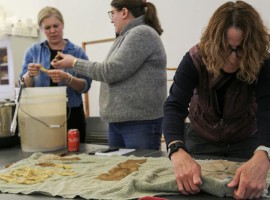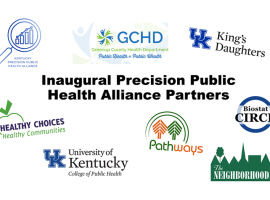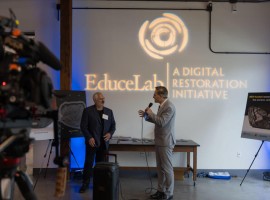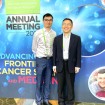John van Nagell Shares the Legacy of the Ovarian Cancer Screening Program
In his 50 years at UK, John R. van Nagell, Jr. has worked with countless patients, faculty and students, but his lasting legacy will likely be the Ovarian Cancer Screening Program at the Markey Cancer Center.
Now in its 30th year, the program has provided free screenings to more than 46,000 women, with 775 ovarian tumors and 103 malignancies found. Though the use of transvaginal ultrasound as a screening method has been controversial over the years—with critics suggesting it may lead to unnecessary surgeries—van Nagell emphasizes that newer technologies such as molecular genetic testing will help identify women with the highest risk profile who could most benefit, and the research itself has already taught physicians much about finding malignancies.
"We now know, because of this screening program, that certain ovarian cysts are always benign," he said. "We're not saying that ovarian cancer screening should be adopted nationally out of a research setting. But, what we are saying is more research needs to be done on it, and that's where the University of Kentucky, in my view, has been a leader."
Van Nagell was recently honored for his years of clinical, research and educational work on a national level, earning the Society of Gynecologic Oncology's Distinguished Service Award for 2017. Listen to the podcast to hear his reaction to this recent national recognition and learn what keeps him motivated.
John van Nagell Shares the Legacy of the Ovarian Cancer Screening Program - Podcast Transcript
Have you ever wondered who was doing the research that will impact your future? The research podcast lets you met those people, and learn how the University of Kentucky is exploring and strengthening our understanding of the world through research and discovery.
Here's Alicia Gregory, director of Research Communications.
Alicia: Today we’ll meet John R. van Nagell Jr., Director of the Ovarian Cancer Screening Program at the Markey Cancer Center. This month he received the Society of Gynecologic Oncology’s 2017 Distinguished Service Award. He starts by telling us why he first came to UK.
John van Nagell: I was brought up in Kentucky, in Oldham County. I went away to school in the Northeast, and I went to Harvard and the University of Pennsylvania School of Medicine, but I always wanted to come home. And when it came time for me to decide where I wanted to undergo further training, University of Kentucky was just opening and it was thought to be an outstanding, new medical center. So, of course, I wanted to get closer to home, so that's where I came. I think I've stayed here because it's a wonderful place to be, to study. I've always loved the medical center. I think it's been very good to me.
Alicia: So tell me a little bit about the Ovarian Cancer screening program that you direct.
John van Nagell: A number of ladies would say, when they were treated here, well, isn't there anything we can do to allow for earlier diagnosis of this disease? And, one of the ladies was Virginia McCandless, who was the health director for the Kentucky Extension Homemakers. And, she actually was diagnosed again with advanced ovarian cancer, when the symptoms occurred, and she was treated here and she said, well, you know, I just want to do something. And, so we came up with the idea if every women in the Kentucky Extension Homemakers would give one dollar, then we would be able to give educational materials back, and allow them to have free screening. So, that sort of started the ball rolling, and I think, since that time, we've probably provided free screening to over 50,000 women, mostly from Kentucky, and we have been able to detect ovarian cancer at an earlier stage in many women, than just waiting for symptoms to occur. And, actually, the survival rate of women in our Ovarian Cancer Screening Program who get ovarian cancer is about double that of women that didn't have screening.
It's a very difficult disease to screen for. Because it's rare, it produces no symptoms reliably. That you can say well, I have this symptom and therefore I've got ovarian cancer. I mean, the symptoms that it produces, even with advanced disease, are very nonspecific, and that's why, really, women don't sense anything is wrong. They don't come in until something's really wrong.
Alicia: The transvaginal sonography, which was the screening method that you use. It's been viewed as a little bit controversial by some critics, who think it may lead to unnecessary surgeries. And, you've defended this is the press over the years.
John van Nagell: That's right.
If you don't know that anything's wrong, and you come in for screening, and they find an ovarian tumor, then, well, the question is, do I need surgery or not? Now, when we first started, it was the rule, the usual standard of care, that if you had ovarian tumor, you should have surgery to take it out. I think very, very rarely, would we operate on a patient, and have nothing be found in their ovary. I mean, the ovary has an abnormality, an ovarian tumor, when we operate, but not all of them are malignant. So, you could look back in the rearview mirror and say, Geez, you know, if I knew it was benign, maybe I wouldn't have wanted surgery. But the problem is, you don't know.
John van Nagell: So, so I think what we've done in terms of growing the research, we've tried to advance our algorithm and it's sort of based on the understanding that an ovarian tumor and changes in ovarian size is a dynamic process. And, we now know, because of this screening program, that certain ovarian cysts, for example, are always benign. We never knew that before the screening. So, now, when we see those, we're able to say, no, we won't operate on those. On the other hand, if there is a type of tumor that has some complexities and maybe papillary projections or solid area, then that's a little bit more problematic because the risk of ovarian malignancy in those tumors are higher. So, we're trying to correlate, always, the morphologic picture with the risk of malignancy.
And, furthermore, if we are able to take a picture of an ovary today, and then, in four weeks take another picture of it, if this is a malignant ovarian tumor, generally speaking, it's growing, and it's looking more complex and more threatening, in a way, with time. On the other hand, if you have a benign ovarian tumor, maybe it will even go away, or get smaller. So with time and serial evaluations, now, we can tell a lot more. And, so, we're constantly trying to improve our algorithm with repeat studies, so that we're able to predict risk of malignancy more accurately. We're trying to keep the risk is less than the benefits of the procedure. And, I would say 99 times out a hundred, the initial surgery we perform is laparoscopy, and you know, in that situation, the patient can go home often that evening or the next morning.
John van Nagell: It's one thing to say, “Oh, well, ovarian cancer screening is not perfect, you miss some cases, sometimes you think things are higher risk than they really are”. But, without it, where does that leave women? We know that women coming in for an annual pelvic examination, that has absolutely minimal diagnostic efficacy. I mean, some people would argue, you can't diagnose ovarian cancer on pelvic exam because, and particularly in an early stage, because many women, particularly in the post-menopausal years, the size of the ovary is so small, you can't feel it reliably on pelvic examination, much less feel a small abnormality in something which is less than an inch and a half in diameter. It's just not that accurate. And, if a woman has an enlarged uterus, or if they happen to be overweight, it's even more difficult. We don't want to, in my view, write off the early detection of ovarian cancer, because it's so difficult. Because, really, when you look back on it, the majority of women that in my career, have been cured, have had early stage disease.
I think where we are in screening, is we're not saying that ovarian cancer screening should be adopted nationally out of a research setting. But, what we are saying is, more research needs to be done on it, and we're doing it. And, I think that a lot of research needs to be done on the at-risk population. Who should be screened? But we can do a better job through molecular genetic testing and things like that, of identifying women who are at the highest risk profile, and maybe, providing screening to that segment of our population. But, when we do that, we need to have the best screening algorithm. And that's where the University of Kentucky, you know, in my view, has been a leader.
Alicia: So, tell me a little bit about how you've stayed motivated and inspired after decades in this area.
John van Nagell: If you're not inspired by trying to perfect something which you know can be lifesaving- you know, I'm absolutely as committed as ever. All you have to do is just go back into the clinic and see one case after another of ladies coming in with advanced ovarian cancers that had no symptoms early. And, by the time they developed symptoms, they really had incurable disease. And, so that is constantly a reminder. But I think it's almost, the word short-sighted, if you do not emphasize research on early detection. Because, we have been all about doing research on chemotherapy, and all the types and ways, agents of giving different forms of chemotherapy, different ways, giving intraperitoneal chemotherapy, intravenous chemotherapy, even bone marrow transplant, and the cure rate of ovarian cancer has virtually not changed, you know, with all of that. On the other hand, if you can detect an ovarian cancer at stage 1, through early detection and screening, the five-year survival rate for those women; 90 percent. Whereas if you wait till the patient has stage 3c or 4 disease, the ultimate cure rate is only about 10 percent. Now, the five-year survival rate may be as high as 40 percent, but the majority of those people that are alive with advanced disease still have it, and eventually it's gonna be a fatal disease.
Alicia: What have been some of the most fulfilling moments for you in regards to your research?
John van Nagell: I think the most fulfilling part of the research is just seeing women that have been detected who knew absolutely nothing was wrong with them. And, they really had a potentially fatal disease, and then we were able to treat it, and now they're fine. These women are faithfully coming back here as part of the follow up for the research, and there's no more grateful…I mean, to me, it's all about the lives of people that have really been really altered for the better by the screening program.
Alicia: So, how does your research impacted the way you train students in the medical center?
John van Nagell: I think the fact that the ovarian cancer screening program is here, in the clinical area, where residents and students and our fellows in gynecologic oncology can all see this, and see the reality of what happens to women that come in and are screened, and know about the technology of screening, and how we do it, and see the pictures generated, and how we approach screening, I think it's very insightful. For example, our fellows in gyno-oncology that are gonna be spend their whole lives in the profession of gyno-oncology all know about screening here and they're very good at it. And, so I think it's been a great educational opportunity for everybody. And, I think, those of us that are more senior are learning every day, too. So, we're trying to perfect, you know, the best early detection algorithm we can.
Alicia: So, what was your reaction when you heard you would be receiving the SGO Distinguished Service Award?
John van Nagell: It's a great honor, really, because I think to be honored by your peers, and particularly knowledgeable peers that are medically committed, is very special. And, also because I think you realize that they know the challenges of screening. They know the imperfections of screening. And, they know that it isn't perfect, and that there are problems with it. But, I think, in a way, I believe that, at least in some small way, this validates what we have tried to do, and that is improve early detection of a very, very serious disease.
Alicia: So, what would you tell someone who's thinking about joining the research or clinical enterprise here at UK?
John van Nagell: Well, I think the University of Kentucky is in a unique position now, because I think it's got great leadership. And great leadership in the medical center. I'm a tremendous admirer of Dr. Karpf. I've been here a very long time, really, since 1967. And University of Kentucky was always an institution with great potential, but kind of untapped potential. But, I think Dr. Karpf has moved us forward tremendously, and therefore, his leadership has been translated into making the university a great place to be and to do research at. And Dr. Evers is another tremendously effective leader. And, I think the Markey Cancer Center is not only the best facility for cancer patients in the state, but regionally. And I think everyone is aware of the NCI cancer center status that we have, and that we're fully on the way to comprehensive cancer status. So, this takes great dedication and great leadership. So, I think, if I were to say anything to younger research-oriented people, I mean, this is the place you want to be. It's exciting to be here. It's a great opportunity.
Thank you for listening to the Research Podcast. To subscribe to our podcasts on Soundcloud or iTunes, search University of Kentucky research media and visit our site; reveal.uky.edu.





